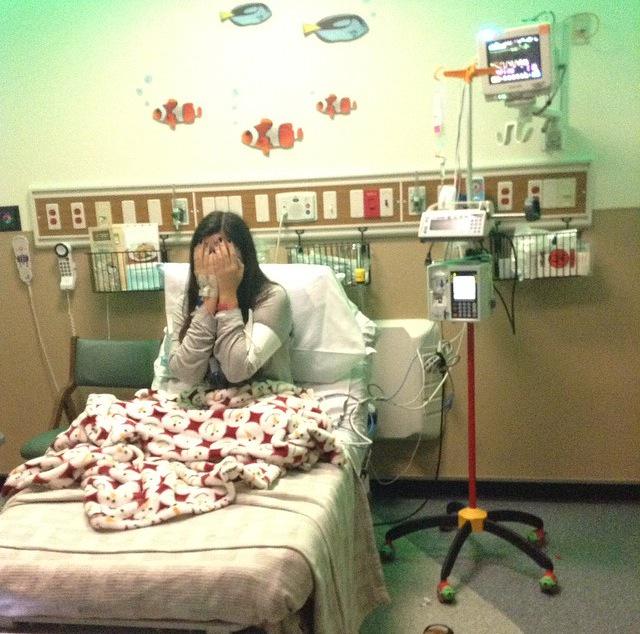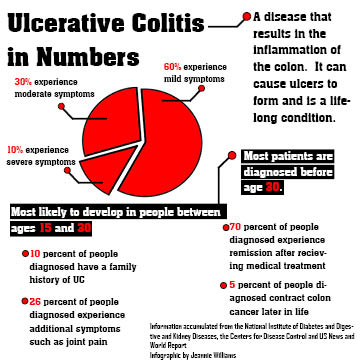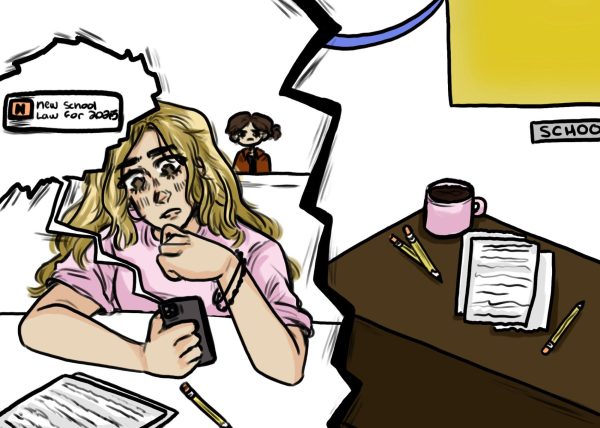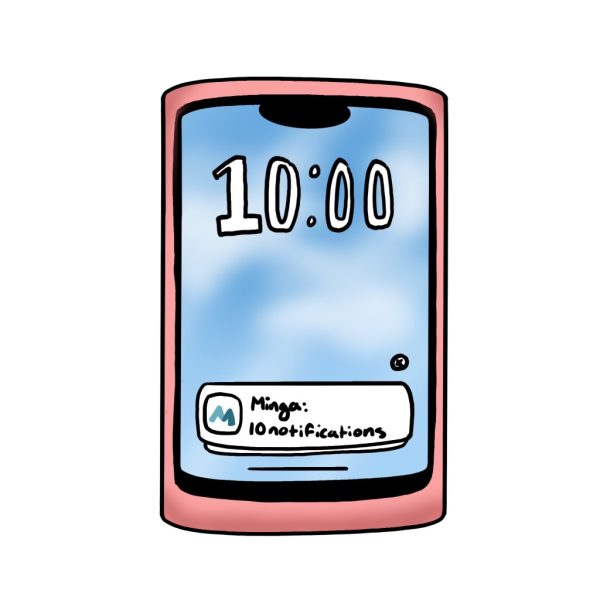Junior Kim Ariza copes with disease, finds support
photo by Hannah Suehle
Junior Kim Ariza laughs at her younger sister’s attempts to cheer her up while receiving chemo. Ariza’s first day of chemotherapy was spent with her family and friend Hannah Suehle.
In March of 2014, the theater department chaos was in full swing as final preparations for the spring musical “Urinetown” came together. For backstage crewmember Kim Ariza, then a sophomore, March of 2014 was the beginning of a battle with ulcerative colitis.
Most students have not heard of ulcerative colitis, the inflammation of the colon, sometimes resulting in ulcers. The disease does not have a permanent cure, but patients can go into remission.
Ariza began exhibiting symptoms during the final rehearsals of “Urinetown.” After her diagnosis, Ariza was placed on a variety of strong medications, including some steroids.
“At first I thought it was just some virus or flu, but then I realized, ‘Okay, this is not going away. There is something seriously wrong,’” Ariza said.
Although she was still able to participate as backstage support in the musical, Ariza was only in the early days of her treatment. By December, her doctors had decided to start her on chemotherapy.
Every three to six weeks, Ariza reported to Florida Hospital to spend half her day receiving chemo. She would typically miss one to two days after her treatment to recover from the side effects, such as nausea and fatigue.
Several friends worked to make her experience easier. Ariza’s close friend, senior Hannah Suehle, recalls using the multi-colored light switches in Ariza’s hospital room to fashion a make-shift dance party to lighten the mood.
“It was upsetting, but we were able to have fun with it and brighten the situation,” Suehle said.
Another friend, junior Britney Fishbein, would sometimes refrain from eating foods Ariza could not, such as high fat and sugar foods, so that she would not feel alone.
The chemotherapy Ariza received was unlike the typical drug used to treat cancer. Her treatment was designed to target specific types of cells, so she did not suffer the tell-tale sign of chemotherapy, severe hair loss. However, her hair did thin some. This, combined with her numerous absences, attracted the attention of her classmates.
“When you miss school that much and when you start to look a little different, people start to notice,” Ariza said. “People started asking me about it, and that’s when I started opening up and became more okay with it myself.”
Ariza continued chemotherapy until March 2015, when it became apparent no real progress was made with the treatments. She then switched doctors and was placed on yet another medication.
Once more, Ariza was doing what she loved: preparing for the spring musical “Hello Dolly!” as a backstage crewmember and helping with props. As opening night approached and things were looking up, Ariza began feeling ill and ended up hospitalized for a flare of her disease.
Ariza says she cried opening night, devastated she “wasn’t going to get to see [her] baby come to life.”

When she was at a low, another friend pulled through for Ariza. Senior Taylor Greyard organized the entire cast of the show to sign a giant “Get Well Soon” card for her.
“I wanted to make sure she knew that she had multitudes of people behind her that loved her and cared for her,” Greyard said.
Nine days in the hospital was rough on Ariza. Although nurses tried to get her to leave her room and go for walks, she opted to stay in. The support of friends from school and church made her stay easier. She had received a plethora of cards, flowers, balloons and stuffed animals by the time it was done.
Family came from everywhere to support Kim, including her godmother who flew in from Wisconsin to stay with her in the hospital so her parents could work.
“We don’t take things for granted anymore, and we’ve become closer and stronger as a family,” Ariza said. “In a way, we’ve been really positive, and this disease has been a positive thing in my life.”
After her release, Ariza could not go back to school and had lots of work to make up. She finished her sophomore year near the end of summer. Fortunately, she had teachers that were willing to work with her to get it all done.
Besides classwork, Ariza’s teachers went out of their way to show their support. Ariza is still grateful for all the times her English teacher, Samantha Richardson offered help.
The experience has fueled Ariza’s desire to help others. She hopes to become a neonatologist, and this has helped her feed her fascination with medicine. She spends her appointments asking tons of questions so she can learn more.
Things are looking up for Ariza, who is now on new medications and is looking forward to playing a lead role in the upcoming play, “Our Town.”
“I don’t think you can ever really tell when it’s the worst part. It’s still early on and this is something I’m going to have to deal with for the rest of my life,” Ariza said. “It has definitely been a journey, and there have been some bumps in the road, but it’s smooth sailing for now, as far as I can see.”
Your donation will support the student journalists of Hagerty High School. Your contribution helps us publish six issues of the BluePrint and cover our annual website hosting costs. Thank you so much!








